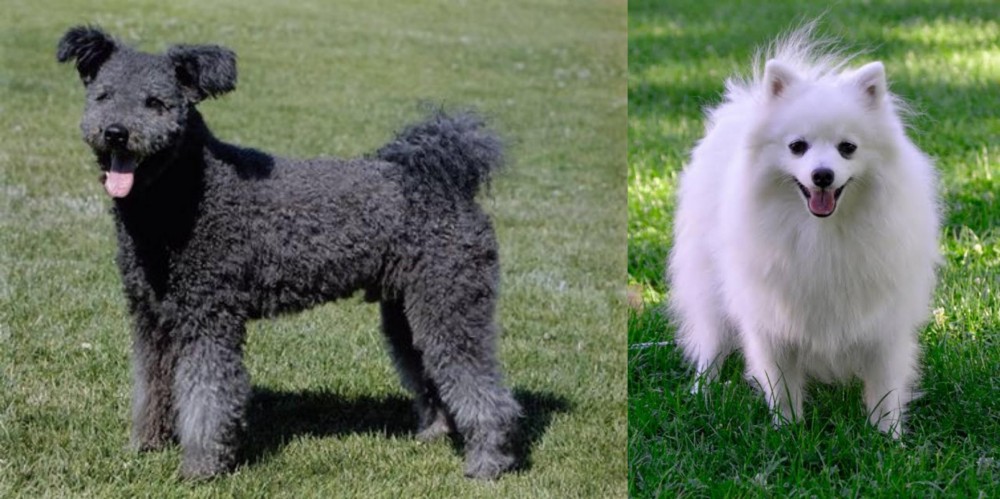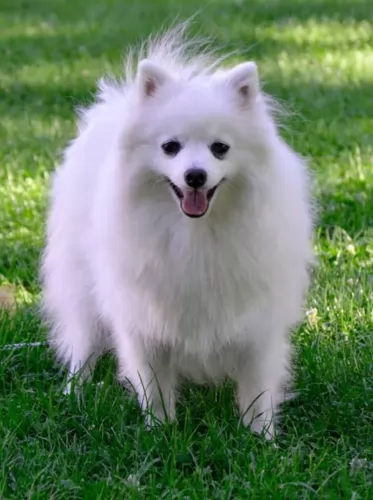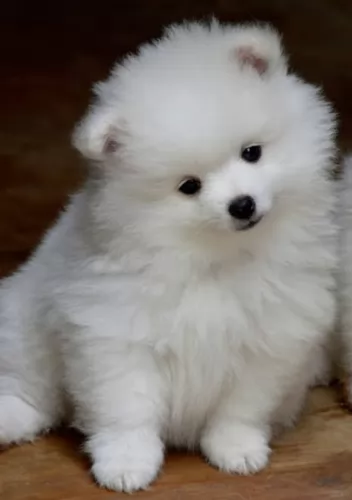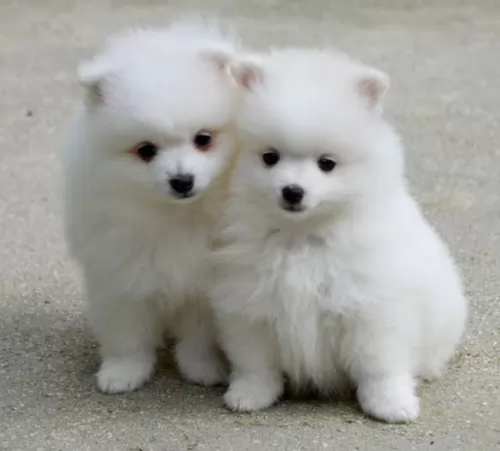 Petzlover
Petzlover Pumi is originated from Hungary but Volpino Italiano is originated from Italy. Pumi may grow 17 cm / 7 inches higher than Volpino Italiano. Both Pumi and Volpino Italiano are having almost same weight. Both Pumi and Volpino Italiano has almost same life span. Both Pumi and Volpino Italiano has same litter size. Pumi requires Moderate Maintenance. But Volpino Italiano requires High Maintenance
Pumi is originated from Hungary but Volpino Italiano is originated from Italy. Pumi may grow 17 cm / 7 inches higher than Volpino Italiano. Both Pumi and Volpino Italiano are having almost same weight. Both Pumi and Volpino Italiano has almost same life span. Both Pumi and Volpino Italiano has same litter size. Pumi requires Moderate Maintenance. But Volpino Italiano requires High Maintenance
 The Pumi is a small to medium sized dog which comes from Hungary. They have always been used for guarding livestock.
The Pumi is a small to medium sized dog which comes from Hungary. They have always been used for guarding livestock.
It was in 2004 that the the Pumi was accepted by the American Kennel Club Foundation Stock Service program. Also in the country of the dog’s birth, the Pumi Club was founded, and in 2011, the dog was also accepted into the AKC into the Miscellaneous class and into the herding group too.
In the UK in 2015, the Kennel Club also accepted the breed standard
 This Italian bred dog is Spitz-type and very ancient. The Spitz breeds have been around since at least 4000BC. Archeologists have found remains that match the Spitz heritage of fox like heads, curly tails, erect small ears. In Greece in 400BC there were engravings of these dogs. Michelangelo painted the breed as he lived with one. In 1888, the Queen of England – Victoria – brought 6 back to England from Florence.
This Italian bred dog is Spitz-type and very ancient. The Spitz breeds have been around since at least 4000BC. Archeologists have found remains that match the Spitz heritage of fox like heads, curly tails, erect small ears. In Greece in 400BC there were engravings of these dogs. Michelangelo painted the breed as he lived with one. In 1888, the Queen of England – Victoria – brought 6 back to England from Florence.
The Italians have loved the Volpino for centuries. These little dogs that resemble the Pomeranian so much but existed much before them. It was very early in the history of the domesticated dog that the Volpino moved from north to south. The Italians called them Volpino because it means foxy dog. They also called them Lupino which means wolfy dog.
The breed was never seen outside of its home range in Italy until the 1880’s and it is still a rare breed. However since the 1980’s the breeders of the American Eskimo brought some from Italy to the US and claimed they were American Ekimo runts. They interbred the Volpino with the American Eskimo creating the toy and mini Eskimo.
The Volpino was a guard dog alerting the Mastiffs to the presence of intruders. The Mastiff would then respond to the intruder. The Volpino was also a popular companion animal due to their easy temperament and their high intelligence level. However they grew less popular and by 1965 there were only a few registered dogs left. There was an attempt to revive the breed in 1984 when dogs that still lived on farms were used as new stock. Even with this, they remain a rare breed and only about 4000 are alive throughout the world.
The Volpino have been denied AKC registration or stock registration as they are considered to be too much like the American Eskimo Dog. However they are recognized by the FCI, the UKC, the ENCI (Italian National Kennel Club), the North American Volpino Club, the Volpino Italiano Health and Genealogy Club and the Volpino Club of America.
 The coat is a fawn, greyish silver or sandy color. The grey Pumi's are thought to be the more common color.
The coat is a fawn, greyish silver or sandy color. The grey Pumi's are thought to be the more common color.
The medium length coat is thick and curly with the top coat being fairly harsh to the touch.There is very little shedding. The dog has semi-erect, semi-floppy ears which are high set. The eyes are small and dark.
With his tight curly coat, his kinky tail and bright expression, you’d think the Pumi was just for entertainment and a playmate, but he is a serious worker too, loving to be busy, whether for work or play.
The Pumi is lively and bold and always ready for fun and action. He is intelligent too, and early training and socialization will be important to keep him manageable and a pleasure to have around. Because he is smart he won’t have trouble learning. They’re good with children and other dogs in the family.
 The Volpino is about the same size as the Pomeranian and smaller than the American Eskimo Dog. They are a rare breed and they have a soft, thick coat and they can be red, white or champagne. With the pointed ears and muzzles, they do look like a fox. They have large thick tails curling over their back and they have double coats.
The Volpino is about the same size as the Pomeranian and smaller than the American Eskimo Dog. They are a rare breed and they have a soft, thick coat and they can be red, white or champagne. With the pointed ears and muzzles, they do look like a fox. They have large thick tails curling over their back and they have double coats.
 The Pumi is a comical looking dog which some people assume makes him a bit of a lapdog, but this isn’t true. Yes, he loves to receive love and attention from his human family, but he isn’t a lapdog.
The Pumi is a comical looking dog which some people assume makes him a bit of a lapdog, but this isn’t true. Yes, he loves to receive love and attention from his human family, but he isn’t a lapdog.
He likes to be busy if he can. He is smart and quick to learn and is affectionate, playful, loyal and loving.
His small size allows him to adapt easily to life in the city or the countryside, but he will need to be exercised. If you’re looking for a lively, amicable pet and companion, the Pumi can make an excellent family pet.
 With the Pumi, you’re really getting a robust little dog. With good care, he can push to 14 years of age and even much older. Of course, as with all other dogs, he is prone to some of the more common dog illnesses.
With the Pumi, you’re really getting a robust little dog. With good care, he can push to 14 years of age and even much older. Of course, as with all other dogs, he is prone to some of the more common dog illnesses.
Hip dysplasia is nearly always one that needs to be listed as it is really a common dog ailment that can lead to lameness.
This is an abnormal formation of the hip socket which in its severest form can lead to lameness. Luckily there are advances in veterinary medicine that make it possible for a dog with hip dysplasia to be happy and pain free.
This is an incurable, progressive disease which effects the spinal cord of your dog and is found mostly in older dogs. It’s very sad because as the disease progresses it can lead to loss of coordination in the hind legs, difficulty with supporting weight with the hind legs and also urinary and fecal incontinence.
This is an inherited disease that sadly might require you saying goodbye to your beloved 4-legged family member.
 The Italian Volpino has better health than most dogs due to so much isolation for so many years. However they are susceptible to some diseases and genetic issues.
The Italian Volpino has better health than most dogs due to so much isolation for so many years. However they are susceptible to some diseases and genetic issues.
• PLL Primary Lens Luxation – Genetic mutation of the eye. Very painful and usually occurs between 4 and 8 years of age. Usually results in euthanasia.
• Patellar Luxation – moving knee cap – can result in lameness and/or arthritis.
 You can never be slack when it comes to choosing food for your pet. If you can provide him with wholesome food then you will be promoting health and longevity.
You can never be slack when it comes to choosing food for your pet. If you can provide him with wholesome food then you will be promoting health and longevity.
If you choose one of the commercially manufactured dog foods, make sure it is the high quality ones full of vitamins and minerals and free from all kinds of colorants and fillers.
Certainly provide him with some home-made food too, but keep it simple and tasty. An excellent home-made diet is boiled chicken, brown rice or pasta, sweet potatoes, carrots and spinach, all chopped up and mixed in twice a week with the dry kibble.
Every now and again, if you can afford it, you can also give him some raw meat added into the kibble. Plain and simple, your pet will thank you for providing him with an uncomplicated diet, gentle on his digestive system.
Make sure he always has a bowl of fresh, cool water available to him.
Energetic and lively, the Pumi is going to need regular exercise as well as mental stimulation. Show him a tennis ball and his eyes will light up as he just loves a game. Take him on a walk and include him in your ball games.
The Pumi’s coat is medium length and curly and he will need it combed to keep it free of matting. The coat will also need to be trimmed if you don’t want it becoming unruly.He isn’t a heavy shedder but will need his coat being attended to twice a week.